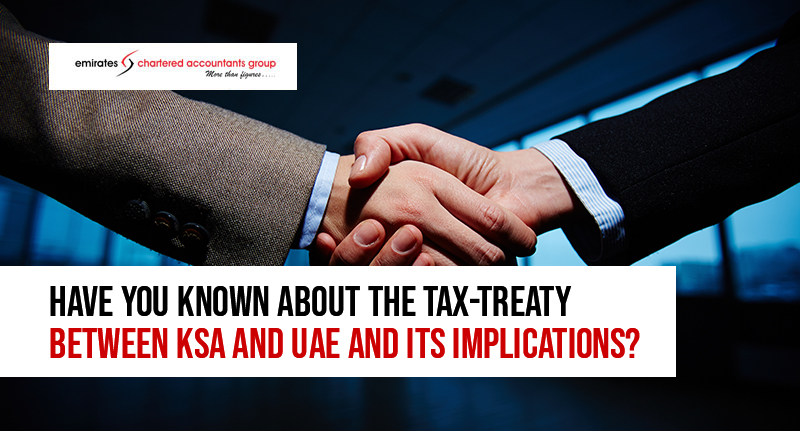
- Oct 28,2021
- All | International Taxation
Tax Treaty between the UAE and Kingdom of Saudi Arabia
The Income Tax Treaty also referred to as the Double Tax Avoidance Agreement between the United Arab Emirates (‘UAE’) and the Kingdom of Saudi Arabia (‘KSA’) entered into force on 1 April 2019. The Treaty, signed on 23 May 2018, is the first of its kind between the two GCC countries.
We present herewith the highlights of the Tax Treaty:
Article 2: Taxes Covered as of date:
For KSA:
- Income Tax
- Zakat
For UAE:
- Income Tax
- Corporate Tax
Article 4: Resident:
Any Person subject to tax because of his residence, place of establishment, place of administration, including administrative departments or local governments.
Tie Breaker Rule:
Individual à Permanent Home à Vital Interest àHabitual Residence (Usual Residence) àCitizenship àAs decided by the Competent Authorities
Other than an individual à Place of Effective Management (actual administrative center)
Article5: Permanent Establishment (‘PE’)
Specific Inclusion:
- Management Center.
- a branch.
- an office.
- a factory.
- a workshop.
- Any other place to extract natural resources.
Specific Exclusion:
- Facilities for the purpose of storing and display of goods and maintenance of its stock
- Fixed place of business solely for the purpose of purchasing goods/gathering information
- The activity of a preparatory or auxiliary nature for the project
Installation PE: If the project continues for more than 6 months
Service PE: Providing Services for more than 183 days during any 12 month period that begins or ends in the relevant fiscal year.
Agency PE: Habitually exercising authority to conclude contracts. Also if a dependent agent maintains a stock of goods from which it regularly delivers goods on behalf of the enterprise.
Exemption for auxiliary and preparatory activities and facilities for maintaining the stock of goods for delivery on behalf of the enterprise will not apply to a fixed place of business used or maintained by an enterprise, if the enterprise or a connected enterprise, carries on business activities at that same place or another place in the same State. (Anti-fragmentation Clause)
Article 7: Business Profits
Profits of the project shall be subject to tax in the country where it has a PE. The quantum of profits that would be taxed can be the profit attributable to the PE in that State. The profits would be calculated after deducting allowable expenses as specified in Article 7.
The treaty also has a limited force-of-attraction rule due to which profits from sales of goods or merchandise of the same or similar kind as those sold through the PE, as well as from other business activities carried on in that other state would have to be included in the profits of the PE.
Withholding Tax Rates
|
Reference to Article in the Tax Treaty |
Nature of payment |
Withholding Rate as per Tax Treaty |
Withholding Rate as per Domestic law in KSA1 |
| Article 10 | Dividends | 5% | 5% |
| Article 11 | Interest2 | 0% | 5% |
| Article 12 | Royalties2 | 10% | 15% |
| No specific Article in Tax Treaty | Fees for Technical Services | NA | 5% / 15%3 |
| No specific Article in Tax Treaty | Management Fees | NA | 20%3 |
- There is no withholding tax regime in UAE at present
- The recipient should be the beneficial owner.
- UAE residents providing such services or deriving income thereon from KSA could argue that receipts shall be covered under the Business profits article and if there is no PE created in KSA then there should be no tax (withholding tax) on such fees.
Article 13: Capital Gains
Currently, there is no capital gains tax in UAE. The provision of capital gains is therefore more relevant for UAE investors investing in KSA.
| Profits arising from | Taxability |
| Profit on Sale of Immovable property | Taxed in KSA if the immovable property located in KSA |
| Profit on sale of movable assets | Taxed in KSA if the entity has a PE in KSA |
| Profit on sale of unlisted company shares | Taxed in KSA if shares are of KSA resident Company |
| Profit on sale of listed shares | Exempt (subject of prescribed conditions) |
| Profit on transfer of ownership of ships and aircraft | Taxable in the State where the actual management center of the project is. |
Article 14: Independent Personal Services
An individual (resident in UAE) providing professional services in KSA shall be taxed in KSA to the extent of the profit attributable to that fixed base/activities performed in KSA, if:
- He has a fixed base in KSA
- He is in KSA for more than 183 days in any period of 12 months
Article 16: Board Members Fee
Remuneration paid to the Board of directors of a company may be subject to tax in the State in which the Company is resident.
Article 24: Methods of eliminating double taxation
Double taxation can be eliminated under the DTAA by way of credit against tax payable.
However, DTAA clearly mentions that these provisions cannot reduce any Zakat tax obligations in the KSA.
Article 27: Special Provisions - Sovereign Exemption
Government investments are exempt from tax in the other contracting states.
Income resulting from such investments, including gain on disposal would also be exempt.
Article 29: Miscellaneous Provisions
- Income/profit from the exploration of exploiting of natural materials (Oil & Gas) in the other contracting state are subject to tax only in the source State.
- Domestic Anti-Avoidance provisions shall prevail over DTAA provisions
- DTAA adopts the minimum standard under BEPS - Action 6, the Principle Purpose Test (PPT)/General Anti Avoidance Rules (‘GAAR’) with the aim to deny treaty benefits when obtaining that benefit under DTAA is one of the principal purposes for any arrangement
- The provisions of DTAA will not be applicable to the tax imposed on income generated from Insurance Activity.
Article 30: Entry into Force
- Entry into force: April 1, 2019: Date from which withholding tax provisions shall apply
- Effective Date: January 1, 2020: Date from which other Provisions of the DTAA shall apply
For International Taxation Support
CA. Manu Palerichal
CEO & Partner
M:+971502828727
E:manu.palerichal@claemirates.com
CA Purvi Mehta
Asst. Manager – International Taxation
M: +971 52 280 0480
E: purvi.mehta@claemirates.com
For Tax Services in Dubai:
Mr. Pradeep Sai
pradeep.sai@claemirates.com
+971 556530001
For Tax Services in Abu Dhabi:
CA Harikrishnan
E: Harikrishnan.Nampoothiry@claemirates.com
T: +971 26435 193
M: +971 569940174




